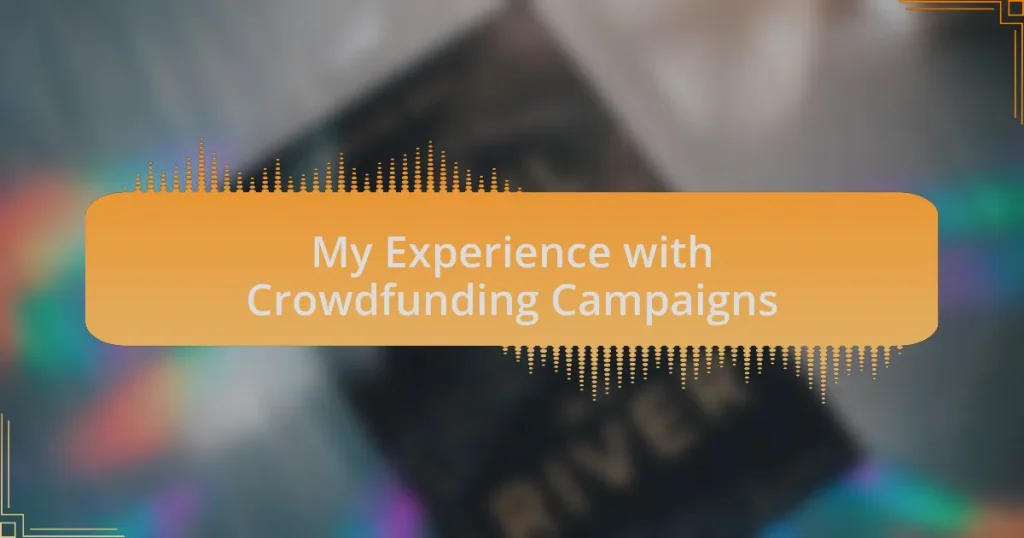Key takeaways:
- Crowdfunding relies on transparent communication and a genuine connection with backers, enhancing trust and support.
- Authors can gain valuable feedback on their work and build a loyal community before publication through crowdfunding.
- Different crowdfunding platforms cater to varying needs, with reward-based platforms being particularly effective for authors.
- Managing expectations and balancing promotion with writing are significant challenges during a crowdfunding campaign.
Author: Evelyn Hartwood
Bio: Evelyn Hartwood is a contemporary novelist known for her compelling narratives and richly drawn characters. With a background in psychology, she explores the complexities of human emotion and relationship dynamics within her stories. Evelyn’s debut novel, “Whispers of the Heart,” received critical acclaim and was shortlisted for several literary awards. When she’s not writing, she enjoys hiking in the mountains and experimenting with new recipes in her kitchen. Evelyn resides in Asheville, North Carolina, where she draws inspiration from the vibrant arts community and the breathtaking natural landscape.
Understanding crowdfunding campaigns
Crowdfunding campaigns are essentially collective efforts where a group of people comes together to fund a project or venture. I remember the excitement and uncertainty I felt when I launched my first campaign – it felt like I was asking the world for a vote of confidence in my vision. Have you ever wondered what it’s like to put something so personal out there, hoping others will support it?
At their core, these campaigns rely on transparent communication and connection with potential backers. I found that sharing my story and the motivation behind my project helped build trust and entice people to contribute. This relationship is crucial; I frequently ask myself, how can I make this connection feel genuine and relatable to my audience?
Another key aspect of successful crowdfunding lies in setting realistic goals and clear, compelling rewards. During one campaign, I decided to offer unique perks based on contribution levels, which really engaged my backers. Reflecting on that experience, I learned that people invest not just in ideas, but in the passion and dedication behind them. Have you thought about how your personal journey could resonate deeply with potential supporters?
Importance of crowdfunding for authors
Launching a crowdfunding campaign can feel like stepping into a spotlight. I remember feeling vulnerable as I shared the message behind my book, realizing that backers weren’t just supporting a project; they were investing in me as a storyteller. How powerful is that connection? It makes every dollar feel like a vote of confidence, pushing me to weave a narrative they would want to follow.
Crowdfunding also provides an invaluable opportunity for feedback before your book even hits the shelves. I was surprised when some backers offered suggestions on my manuscript; insights that shaped its final form. Have you ever considered that this early engagement not only hones your work but also fosters a loyal community of readers eager to join you on your journey?
Moreover, crowdfunding can serve as a marketing tool in itself. I engaged with potential readers long before my book was published, creating buzz and building anticipation. Reflecting on this experience, I realized that a successful campaign isn’t just about the funds; it’s about crafting a network of support that can sustain you beyond the initial launch. Have you thought about how you would cultivate this community?
Types of crowdfunding platforms
There are several types of crowdfunding platforms, each catering to different needs and audiences. Donation-based platforms, like GoFundMe, allow authors to share their stories and receive funds from backers who want to support them without expecting anything in return. I remember using one of these platforms early on, and it felt incredible to see people rallying behind my vision purely out of goodwill.
Equity crowdfunding platforms, such as SeedInvest, attract those who hope to invest and gain equity in your project. This model can be particularly advantageous for authors looking to create multimedia ventures or publish through unconventional methods. However, it also brings an element of complexity, as I found that aligning interests with investors requires careful negotiation and communication.
Reward-based crowdfunding, on the other hand, is where I found my sweet spot. Platforms like Kickstarter or Indiegogo enabled me to offer tangible rewards, from signed copies of my book to exclusive behind-the-scenes content. The thrill of crafting these rewards made me feel more connected to my supporters. Have you ever thought about how a personalized reward can deepen your reader’s engagement with your story?
Challenges faced during my campaign
One of the biggest challenges I faced during my crowdfunding campaign was managing expectations. I vividly recall the anxiety that set in when my initial funding goal seemed dauntingly out of reach. Did I set it too high? Would my supporters rally behind my vision, or would silence fill the gaps where enthusiastic backing should be? This uncertainty bubbled beneath the surface, pushing me to continuously rethink my strategy while trying to maintain enthusiasm.
Another hurdle was the overwhelming amount of promotion required. Juggling my time between writing and marketing felt like a tightrope walk. There were weeks when it felt like I was more of a marketer than a writer. I learned quickly that simply launching my campaign wouldn’t cut it; I had to actively engage with my audience through social media, emails, and updates. Looking back, I wonder if I overextended myself during that phase—did I lose sight of my core storytelling mission in the hustle?
Technical glitches also posed significant challenges. On a crucial day during my campaign, the payment platform I chose experienced a downtime, causing panic. How do you reassure your backers when they might feel their contributions are at risk? I felt vulnerable, realizing the importance of having a backup plan in place. It was a stark reminder that, beyond the creative aspects, managing a crowdfunding campaign also requires technical readiness and a proactive approach to problem-solving.



